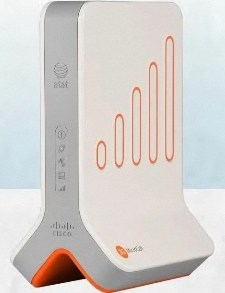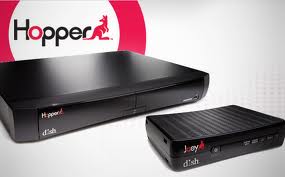
AT&T 3G MicroCell
One of the core principles of Net Neutrality is that all Internet traffic is treated equally — nothing favored, nothing penalized.
AT&T does not seem interested in following that principle, as our regular reader James found out when reviewing the terms and conditions of AT&T’s Internet Overcharging scheme that limits DSL customers to 150GB of usage per month and 250GB for U-verse customers.
AT&T Wireless customers with the company’s 3G MicroCell that covers for AT&T’s network shortcomings are given special treatment if they also subscribe to the company’s wired broadband services: use of the MicroCell is exempt from the wired usage cap.
The MicroCell creates a mini “cell-tower” within the home for wireless devices that do not receive adequate indoor reception, powered by your home or office broadband connection. Customers with smartphones or other wireless devices can use the MicroCell to browse web pages, use apps, make and receive calls, or send and receive text messages without ever worrying about exceeding their DSL or U-verse broadband usage allowance. Want to access that content on your home computer? That does count against your cap.
“So data from another AT&T service which is sent over the same Internet connection as any other data traffic is excluded from the cap? That sounds like a clear Net Neutrality violation to me,” says James.
 From AT&T’s own FAQ:
From AT&T’s own FAQ:
“I have an AT&T 3G MicroCell. Since that utilizes my home broadband network to boost my wireless data signal, does that mean my wireless usage also counts against my wired broadband monthly data plan?
No, the wireless traffic from your AT&T 3G MicroCell does not count toward your monthly home broadband plan. Please register your AT&T 3G MicroCell account and your residential AT&T Internet account at www.att.com/internet-usage-MicroCell to help ensure accurate Internet usage billing. If you have broadband service with another provider, you do not need to register your account.”
The usage cap “free pass” does not extend to your wireless service plan, however. Despite using your home broadband connection, the use of the MicroCell still consumes monthly plan minutes and megabytes, unless you purchase extra add-ons. AT&T would argue it already charged you for your wireless usage, so it would not be fair to charge you again through your home broadband plan. But if you are not an AT&T broadband customer, that is exactly what happens if your local cable operator also has usage billing.
AT&T’s logic for implementing usage caps in the first place:
AT&T has experienced a dramatic increase in the amount of data that is sent and received over its wireline broadband networks. This dramatic increase is driven primarily by a small fraction of our customers. In fact, the top 2% of customers use about 20% of the total capacity on our network. A single high-traffic user can utilize the same amount of data capacity as 19 typical households. Lopsided usage patterns can cause congestion at certain points in the network, which can slow Internet speeds and interfere with other customers’ access to and use of the network.
Customers that blow through their allowance receive one warning and then a higher bill: a $10 overlimit penalty will apply and extends your usage allowance by 50GB. AT&T’s cost per gigabyte is estimated to be in the pennies.
 Time Warner Cable has introduced its usage measurement tracker tool for customers in parts of upstate New York. The tool can be found on Time Warner Cable’s website under the My Services -> My Internet menu for customers logged in on the website.
Time Warner Cable has introduced its usage measurement tracker tool for customers in parts of upstate New York. The tool can be found on Time Warner Cable’s website under the My Services -> My Internet menu for customers logged in on the website.

 Subscribe
Subscribe

 From
From  CNET was forced to withdraw a planned award for Dish Network’s ad-skipping “Hopper” DVR because the website’s owner, CBS, is suing the satellite dish company over the device.
CNET was forced to withdraw a planned award for Dish Network’s ad-skipping “Hopper” DVR because the website’s owner, CBS, is suing the satellite dish company over the device. The Verge added there was clear evidence of a growing influence on the editorial decisions at the digital news subsidiaries owned by CBS, all designed to protect the parent company.
The Verge added there was clear evidence of a growing influence on the editorial decisions at the digital news subsidiaries owned by CBS, all designed to protect the parent company. The billing address on file at Verizon Wireless can make a difference in your monthly bill.
The billing address on file at Verizon Wireless can make a difference in your monthly bill.
